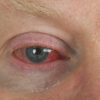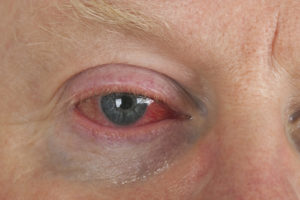
Chronic Fatigue Syndrome and Your Eyes
You may not have heard of it, but you may be suffering from it. Chronic Fatigue Syndrome (CFS) is extreme fatigue that lasts more than six months. It is an intense tiredness and weakness that does not improve quickly with rest. It can also become worse if the sufferer attempts physical activity or mental exertion. It’s estimated that millions of people worldwide suffer from CFS, but the exact number is unknown because so many cases go undiagnosed. Another thing you may not know is that CFS can be connected to eye health and vision.
Chronic Fatigue Syndrome can sometimes be hard to diagnose because the symptoms are common in many illnesses. The eight main symptoms of Chronic Fatigue Syndrome are extreme fatigue, sore throat, muscle pain, joint pain (without redness or swelling), headaches, memory or concentration problems, exhaustion lasting more than one day after physical or mental exertion, and enlarged lymph nodes in your neck or armpits.
There are other symptoms that can occur, but they do not present themselves in every person suffering from CFS. These include the inability to think clearly, balance issues (dizziness/fainting), allergies (foods, medications), irritable bowels, chills and night sweats, mood problems (depression, anxiety, irritability), and visual disturbances (blurry vision or sensitivity to light). CFS is a mysterious disease that affects people differently, and it can also affect their vision in a variety of ways.
Vision and Chronic Fatigue Syndrome

The visual disturbances associated with CFS cover a variety of types. People who suffer from CFS most commonly report blurry vision. Some people also complain of itchy, watery eyes, while others have a real problem with dry eyes. People experiencing itchy or dry eyes often rub their eyes, which only causes more redness and more discomfort.
Other vision issues include problems with being able to focus on items, not being able to focus from a distance, tracking lines of print, ghosting of images, tunnel vision (and other issues with peripheral vision), inability to judge distances, and eye floaters. Clearly, this condition can make it difficult to see properly. You can try some eye exercises to help strengthen your focus muscles, but remember to seek medical attention as well.
Sufferers of CFS who have experienced any of the above problems should see a doctor for an examination. After studying many patients with CFS, doctors have found that patients also often suffer from poor oculomotor control. This means eye movements that are normally quick become slow and sometimes jerky. Sometimes it is difficult for a patient to move their eyes from one object to another.
Another issue that doctors see in CFS patients is exophoria. This means that when one eye is covered the other eye drifts outwards. Doctors also see restricted peripheral fields, low blink rates (and incomplete blinking), staring, small pupils, ocular surface abnormalities, abnormal tear film, and chronic allergic conjunctivitis. CFS can certainly make seeing difficult, but luckily there are things you can do to make the symptoms less severe.
Getting Treatment for Chronic Fatigue Syndrome
Often patients suffering from vision problems are referred to an optometrist or ophthalmologist. Usually, the patients have normal eye exams, which usually result in prescription lenses. But, other times, the patient has such rapidly changing vision that corrective lenses will not help with them. Of course, there are other alternatives that can help with vision issues related to CFS.
There are a number of things you can do to treat the dry eyes that come with CFS. Staying hydrated will help alleviate issues with dry eye symptoms. Warm compresses can also help with dry eyes or with irritated eyes. If the patient is sensitive to light, they should avoid bright lighting such as fluorescence. They should also wear sunglasses whenever they are outside, regardless if it’s sunny or cloudy.
Patients complaining of itchy, watery eyes may also get some relief from over-the-counter antihistamines. Regardless of the symptom, the more tired the patient feels, the more likely their symptoms will be aggravated.
To address the overall health and strength of the sufferer’s eyes, they should consider implementing a vision-strengthening vitamin supplement into their daily routine.
Chronic Fatigue Syndrome sufferers should also find ways to relax. By removing stress from their life, the body and mind will be able to rest and heal more quickly. They should also work to get a full night of sleep. This sometimes means implementing a strict bedtime, installing room-darkening window coverings, limiting daytime naps to an absolute minimum, avoiding caffeine, not drinking alcohol, and giving up nicotine.
Healthy Diet and Chronic Fatigue Syndrome
Healthy eating can heal the body of a multitude of ailments. For people suffering from CFS, a healthy diet will help rebuild their body strength. A diet full of vitamins and minerals will help the body and eyes regain their vigor. If you don’t think you can get all of the necessary vitamins and minerals into your diet every day, consider taking a supplement, such as the Rebuild Your Vision Ocu-Plus formula.
However, you should consult your doctor before beginning a supplement regimen. This is especially true if you are currently taking any medication to treat the other symptoms of Chronic Fatigue Syndrome. You don’t want to accidentally combine supplements or medications that will counteract or even negatively affect each other.
Another way a CFS sufferer can help overcome their illness is to refrain from overdoing it mentally and physically. It is very tempting to do a lot on a day when you are feeling better, but you will probably pay the price for it later by exhausting yourself. Take it slow every day and enjoy the small victories you experience on the way. A rested CFS sufferer tends to go into remission sooner than one who continues to push themselves beyond their limit. Going into remission means that you could experience a longer period of experiencing few to no symptoms of CFS.
So, if you are having problems with CFS and notice it affecting your vision, these simple tips will help you strengthen your vision naturally without overexerting yourself. Give them a try and start seeing a difference in no time!
Our Rebuild Your Vision Ocu-Plus Formula Contains All 17 Vitamins, Minerals, and Herbal Supplements to Improve Your Eye Health!












Thank you for this article. I have not been diagnosed with CFS but have had a noticeably significant decline in energy from about ten years ago. Initially, I addressed burn out and adrenal fatigue by making lifestyle changes (doing less, getting better sleep, meditation, yoga, dietary changes). I feel much better overall but have still struggled with fatigue. I do have a progressively deteriorating hereditary eye disorder and am now eligible for corneal transplants. It was useful for me to make a connection to my fatigue, headaches, vision and the time it takes me to recuperate after particularly busy days or nights when I don’t sleep particularly well. I am now making even more efforts to care for my eyes.
Thank you so much for writing this article. I have chronic fatigue related vision challenges that greatly impact my ability to live a normal life. This article validates my eye problems (I’m not making it up!) But like others said, getting rest and lowering stress is vital but not easy to achieve with CFS. Especially when you are too sick to work a real job and don’t have a stable income. On top of illness you have to battle with poverty; you’re forced to overwork yourself for meager amounts of income, which doesn’t help to bring down the stress. It’s a sad reality for many living with chronic illness and I wish it was easier for them to get the assistance needed.
I agree with the above posts. The paragraph where you explain that we should remove stress from our lives and get a full nights sleep is something we crave on a daily basis. Insomnia is a symptom. Whether a sufferer is on the same end of the spectrum as me or sleeps 12-14 hours, we don’t get deep, refreshing sleep. We wake up feeling like we never slept. The paragraph that explains we should not tax ourselves mentally or physical is what we strive for. We call it pacing and try to live within our energy limits. Even when doing this, for some unknown reason we can fail and end in a crash for days, weeks or even months. I got sick when I was 29 and am now 61 years old. I have never had one day of full energy since getting sick. At best, I start the day with 60% energy and it may be zapped at anytime. It’s a constant battle just to get through the day.
I agree with the comments, I have had this illness now for 6.5 years, and although I have spent most of this time in bed, there is no sign of it giving me a break. At 65yrs, I feel there will be no enjoyment left in my life. I was a hard worker, had 5 children and still try to be a good wife. My biggest hurdle is trying to cook a good meal for my husband and me (without collapsing) as he can’t cook. he works full time, does all the housework, gardening and looking after me. he is 72, and I feel guilty because he is devoted to me. I also have migraines trice a week. This is the most difficult time of my life, the love of my friends and husband will keep me fighting this daily battle till they find a cure.
I’d say this is a fair response to an article that’s helpful, but also seems to imply that CFS is an easily fixable result of poor lifestyle choices such as alcohol, caffeine, and nicotine, which is very inaccurate. This is not to make a criticism of the article writer, who gives some very helpful, hard to find advice here. But CFS is difficult to write about because it’s often not recognized how severe and often untreatable the illness is. Other kinds of serious illness aren’t told to start seeing a difference in no time, and CFS should likewise be recognized as extremely serious. The friend we all know who recovered from chronic fatigue is the exception: the other 95% were in bed and we never had the chance to meet them, so we don’t realize how serious their illness is. There are debates about the appropriate name for the illness, but the fatigue symptom should be respected.
You said
Chronic Fatigue Syndrome (CFS) is an extreme fatigue that lasts more than six months.
This definition is just plain wrong. The primary symptom is cognitive dysfunction. It is a disease primarily involving inflammation and swelling in the brain. Secondary it becomes a systemic disease affecting every part of the body. There is a massive symptom list where fatigue is just one symptom. Very few if any body ever recovers from the disease. Pushing the F-word (fatigue) is trivializing the devastating disease.